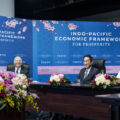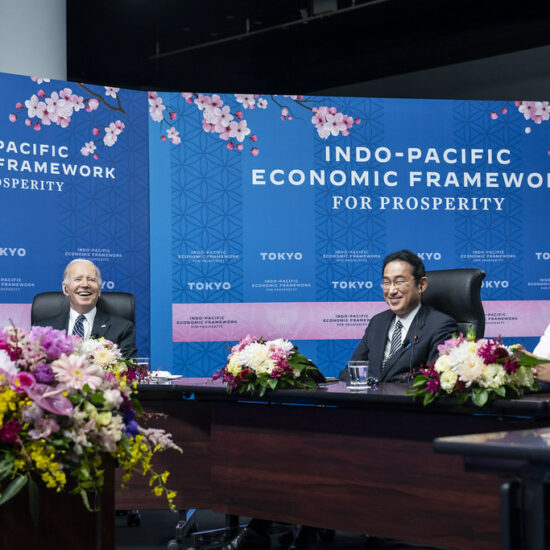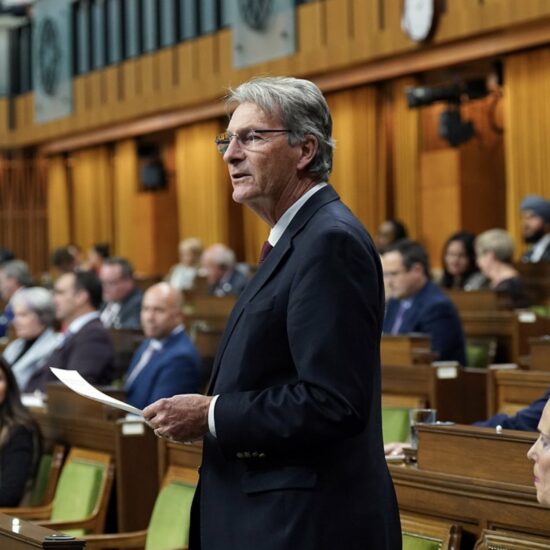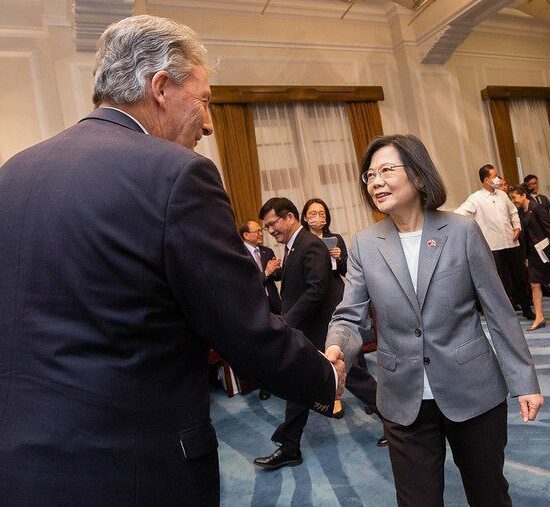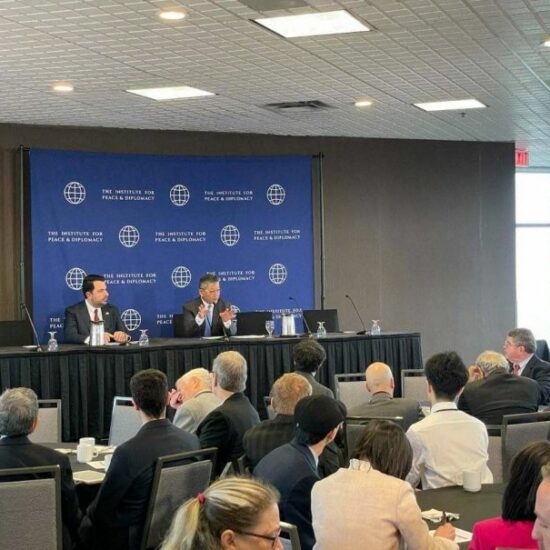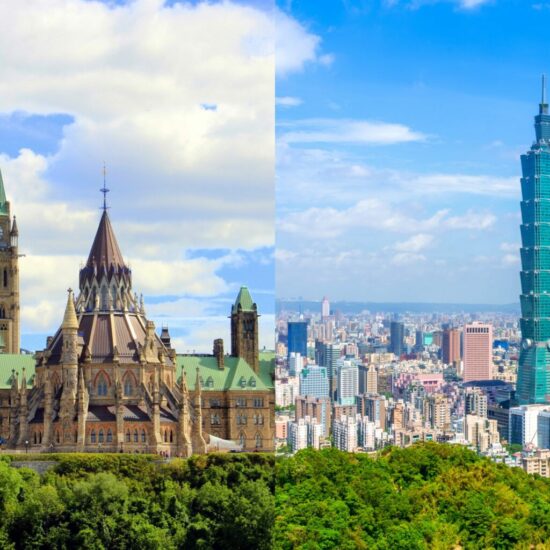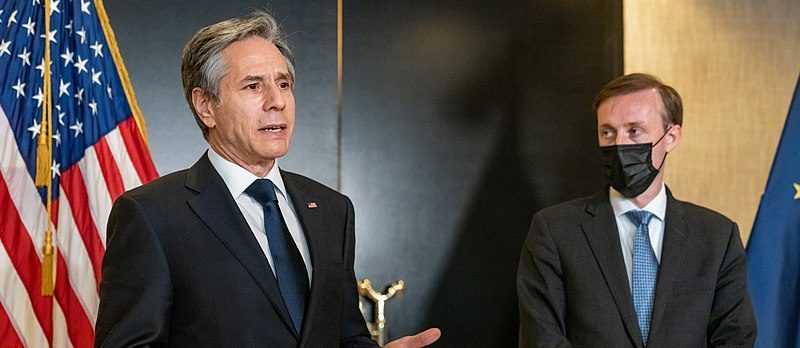
Image credit: U.S. Department of State
During the first US-China summit of the Biden presidency in Anchorage, Alaska, the two countries’ top diplomats engaged in a heated exchange in front of reporters. Secretary of State Anthony Blinkin kickstarted the summit by lambasting China for violating global norms amid allegations of cyber-attacks, economic coercion, and harsh treatment of the Uyghurs in Xinjiang. In response, China’s director of the Central Foreign Affairs Commission Office Yang Jiechi gave a lengthy address and accused the United States of interference in Chinese domestic affairs, while also criticizing America’s own human rights record (on which Beijing consequently published a report). The summit, originally intended to improve bilateral ties after years of strained relations under the Trump administration, not only failed to produce a real compromise between the two sides but it also effectively squandered any goodwill that might have been generated by the change in the U.S. presidential administration. Instead, the meeting put in motion a new round of U.S.-led sanctions on Chinese officials over Beijing’s alleged treatment of the Uyghurs, to which China responded by imposing its own sanctions on Western entities and individuals.
In contrast to Joe Biden’s campaign promise to pursue prudent diplomacy in dealing with China and try to find common ground on areas of mutual interest—such as tackling the Covid-19 Pandemic, reviving the Iran Nuclear Deal, and rehabilitating bilateral trade—the Biden administration has instead continued to rely on the same tired playbook Washington has employed since the 1990s in the wake of the collapse of the USSR, consisting of confrontational rhetoric, aggressive posturing, and the unending spirals of sanctions meant to intimidate and coerce compliance. Adopting this ‘trifecta’ as the basis of America’s strategic approach to China promises to hamper any prospect for meaningful engagement, let alone cooperation, between the world’s two great superpowers – unless the Biden administration decides to retire this failed standard playbook of coercive diplomacy and begins to recognize China as a co-equal sovereign power it should no longer intimidate.
Looking back, in a September 2019 Foreign Affairs piece, Jake Sullivan and Kurt Campbell, both of whom later joined the Biden administration’s foreign policy team in senior positions, argued that the United States must pursue ‘co-existence’ with China, with each country having “to live with the other as a major power.” Under such an arrangement, the authors contended that both powers can selectively compete and cooperate in accordance with their national interests. Following his rise to the presidency, Joe Biden struck a similar tone and labeled China as America’s “most serious competitor” ﹘ but did not go so far as to call it an adversary to be contained. Understandably, the shift in tone from the White House early on marked a stark contrast to the Trump administration’s cold war rhetoric on China, raising hopes for de-escalation and even a possible rapprochement between the two countries.
However, the Biden team’s post-inauguration moves signaled a more confrontational approach towards China. On February 10th, President Biden announced that the Pentagon would review the United States strategy towards China, instead of tasking the State Department with crafting the new administration’s China policy. On March 12th, the U.S. President hosted a publicly telecast virtual ‘Quad’ Summit (a U.S.-led coalition in the Indo-Pacific region composed of India, Japan, Australia, and the United States that is short for Quadrilateral Security Dialogue) with leaders of other member states for the first time since the organization’s founding in an effort to tout America’s strong Indo-Pacific relationships and increase coordination among Quad members. Instead of strengthening its traditional bilateral alliances in the Asia Pacific, the White House is now actively investing in elevating the coalition as a counter-balance to China. In the joint statement that followed the Summit, the group pledged to “meet the challenges to the rules-based maritime order in the East and South China Seas,” indicating further strengthening of naval deployments in the region. Setting an even more bellicose tone, during Secretary of State Anthony Blinkin’s visit to Japan, the two countries named China a threat to the international order. As such, for the time being at least, there seems to be a stronger focus on the strategic competition aspect of the ‘coexistence’ scheme and less emphasis on cooperation.
In fact, President Biden’s China policy seems to hearken back to the Obama era, resembling a more hawkish version of President Obama’s ‘pivot to Asia’ strategy. In 2009, during a speech at Tokyo’s Suntory Hall, President Obama proclaimed himself “America’s first Pacific president” and asserted that the United States will prioritize its traditional alliances and utilize multilateral organizations to strengthen security and prosperity in the region. In this speech, made during his first stop in the Asia Pacific, Obama argued that the United States does not seek to “contain” China. In essence, the newly elected President was counter-balancing engagement with China vis-à-vis closer relations with Japan, hoping to secure a multilateral trade agreement that could serve as a buffer against China’s expanding economic presence in the region.
While the Obama administration facilitated the signing of the Trans-Pacific Partnership (TPP) with U.S. partners in the Asia Pacific, the intentional exclusion of China from the agreement contributed to Beijing’s sense of strategic alienation. Although the TPP reflected a more healthy competitive strategy, the economic effort was coupled with a more assertive naval posture in the South China Sea. Alarmed by the pivot, Xi Jinping increased China’s military budget, reformed the Chinese army, ordered the building of strategic islands across the South China Sea, and increased the country’s naval assets. And thus, the groundwork was laid for further escalations under the Trump administration.
Fast forward to 2021. Instead of recognizing the shortcomings of the pivot and spearheading a new approach based on constructive engagement, Biden has so far chosen to double down on Obama’s failed Pacific Pivot strategy, moving towards military cooperation via the Quad to balance what it deems as China’s hegemonic challenge in Asia. In recent years, Quad members have regularized their joint naval exercises and strengthened defense interoperability in regional waters, with a focus on the South China Sea as a strategic priority. According to precedent, the continuation of this strategy to further corner and isolate China will only further fuel Beijing’s ‘Malacca Dilemma’—a potential blockade of its energy trade lifeline in the narrow strait—and embolden more West-skeptic hardliners in Beijing. This blowback effect will likely have negative implications on the autonomy of Hong Kong and Taiwan in particular, as China will increase intervention and push to undermine what it perceives as a US-led encirclement.
On the other hand, members of the Quad also have diverging interests and different degrees of threat tolerance in the face of increasing pressure from Beijing. With the degree of U.S. commitment and long-term interest remaining unclear, Australia under Chinese economic pressure and forced into a corner, India’s weak military infrastructure and weariness toward increasing tensions in the Himalayas, and Japan careful not to escalate tensions amid its shaky relations with other regional players, including South Korea and Russia, it will be unlikely that the Quad Indo-Pacific bloc could settle on a coherent and sustainable China policy.
Complicating the matter further, in the current political landscape, it is understandable for both sides to resort to increasingly hawkish rhetoric to score wins with their domestic audiences. Negative US public opinion polls on China deter Washington from overt outreach to Beijing, as more moderate voices in the Democrat party try not to appear weak and conciliatory in front of their Republican counterparts and at times oversell their own hawkishness. These internal dynamics help explain the tense atmosphere of the Alaska summit. During that meeting, U.S. State Secretary Blinkin intentionally allowed the media to listen in to his criticism of China’s human-rights record, a move designed to communicate his “toughness” to the American people and demonstrate that holding high-level talks would not translate to an appeasement of Beijing.
However, the United States must avoid turning its over-the-top rhetoric into hawkish policies and needs to be careful not to contribute to the ongoing cycle of escalation. Instead, the Biden administration is better served by focusing on addressing areas of mutual concern and shared interest – turning the dial on the selective cooperation aspect of the “coexistence”. The recent announcement on the establishment of a US-China climate working group was a promising development, signaling that both sides have shown flexibility behind closed doors. In parallel, the administration can work towards re-joining the Comprehensive and Progressive Agreement for Trans-Pacific Partnership (CPTPP). Subsequently, as a show of good faith and to engender mutual trust, the Biden team can signal its openness for China to join the trade pact, in exchange for Chinese compliance with the rules-based framework of the agreement. At last, the United States must refrain from portraying the Quad as an ‘Asian NATO’, a security architecture specifically devised for containing China. Limiting the number of Quad military exercises and utilizing the Indo-Pacific framework for cooperation on trade and health security among member countries can help de-escalate tensions in the South China Sea. For instance, the recent Quad-led effort toward boosting vaccine distribution in Asia was a more appropriate and in kind response to China’s noticeable increase in global vaccine exports as part of its “vaccine diplomacy”.
Coordinating the fight against the Covid-19 Pandemic, lowering the temperature on trade disputes, resolving Meng Wanzhou’s extradition case and securing the release of the Two Michaels, re-opening consulates, reviving academic exchanges, and re-issuing visas to Chinese journalists are among concrete measures toward advancing cooperation that warrant serious discussion in future bilateral meetings. These steps, taken in a mutually choreographed fashion, will provide diplomatic room and the necessary goodwill for further engagement on issues of mutual interest, balancing the reality of inevitable competition among the two superpowers in our multipolar century with the prospect of more cooperation.
Pouyan Kimiayjan is a Research Associate at the Institute for Peace & Diplomacy.

